Essay: Current Debates in Language and Literacy, ECE6004
VerifiedAdded on 2022/07/28
|9
|2313
|32
Essay
AI Summary
This essay delves into the multifaceted issues surrounding language and literacy, with a particular focus on English as an additional language (EAL) within early childhood education. It explores the significance of literacy in national development and global participation, highlighting the challenges faced by children learning EAL, including linguistic and cultural barriers. The essay examines various theoretical perspectives, such as postcolonial theory and reader response theory, to understand the complexities of language acquisition and literacy development. It discusses the impact of technology on literacy, the importance of creating inclusive classroom environments, and the role of developmental theories like Piaget's theory in fostering effective learning experiences. The essay also addresses biases in schools and their effects on students' social identities, concluding with a call for educators to promote home languages and create programs that meet individual child needs. The essay references several academic sources to support the arguments made and provide a comprehensive overview of the subject.
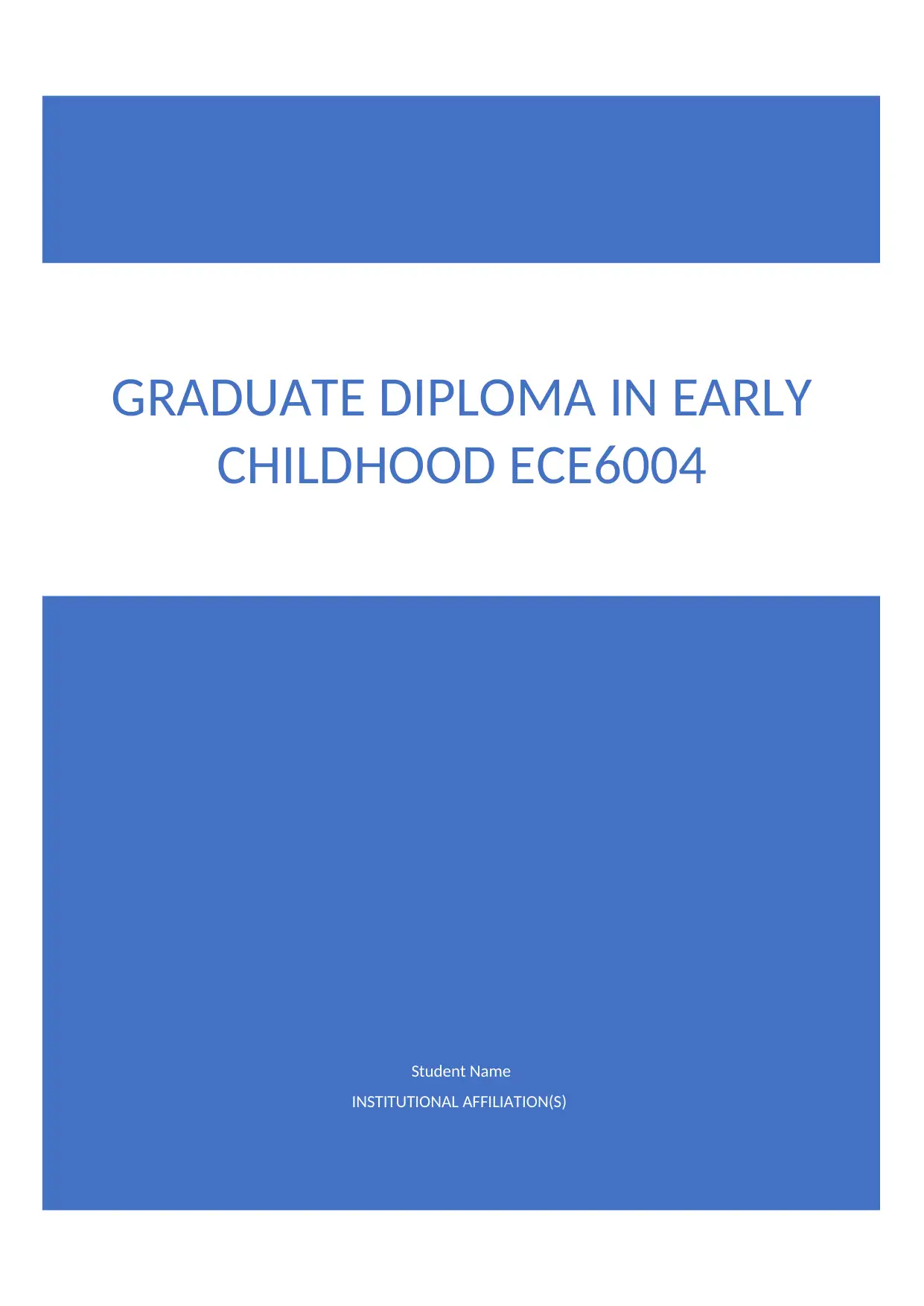
Student Name
INSTITUTIONAL AFFILIATION(S)
GRADUATE DIPLOMA IN EARLY
CHILDHOOD ECE6004
INSTITUTIONAL AFFILIATION(S)
GRADUATE DIPLOMA IN EARLY
CHILDHOOD ECE6004
Paraphrase This Document
Need a fresh take? Get an instant paraphrase of this document with our AI Paraphraser
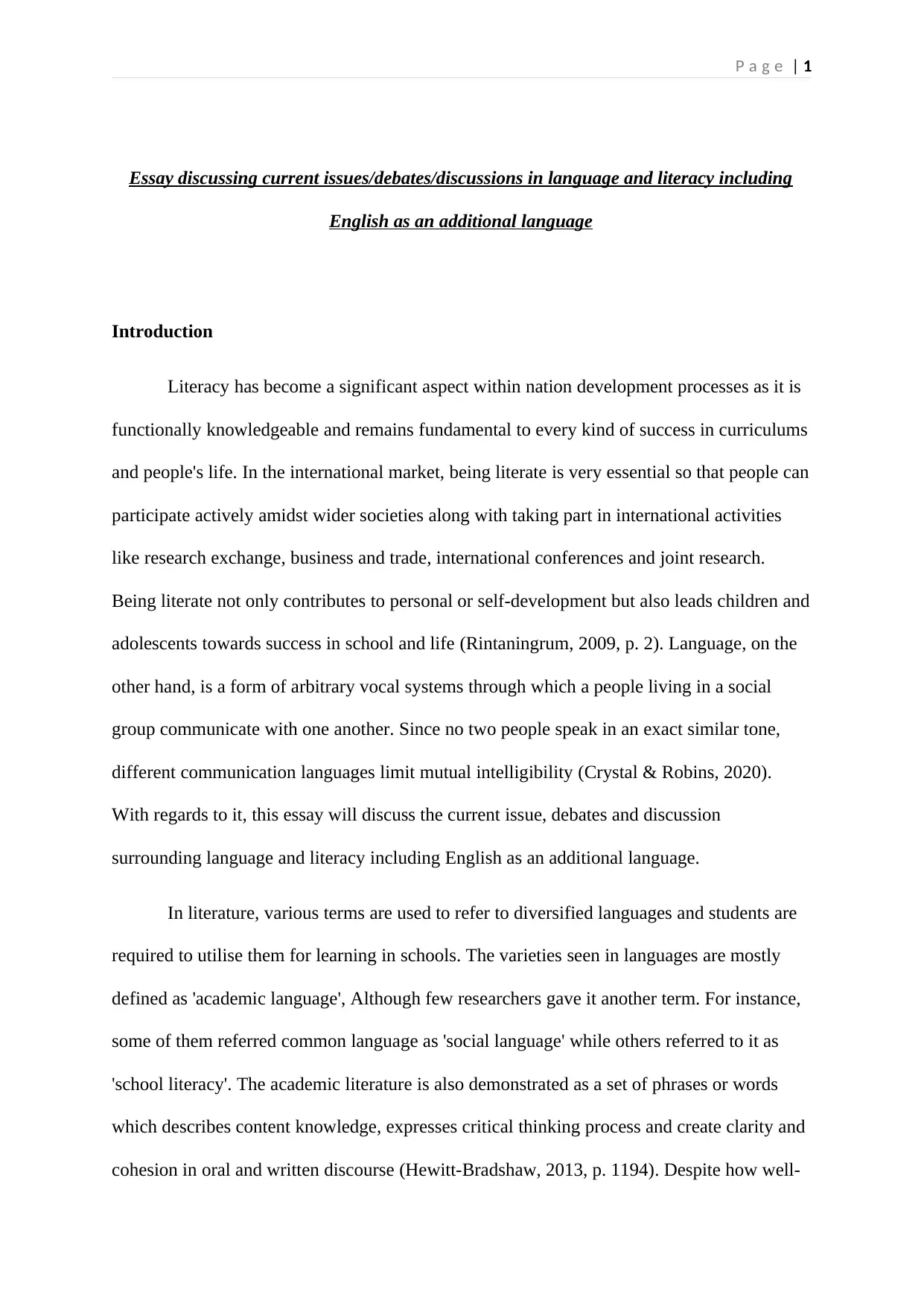
P a g e | 1
Essay discussing current issues/debates/discussions in language and literacy including
English as an additional language
Introduction
Literacy has become a significant aspect within nation development processes as it is
functionally knowledgeable and remains fundamental to every kind of success in curriculums
and people's life. In the international market, being literate is very essential so that people can
participate actively amidst wider societies along with taking part in international activities
like research exchange, business and trade, international conferences and joint research.
Being literate not only contributes to personal or self-development but also leads children and
adolescents towards success in school and life (Rintaningrum, 2009, p. 2). Language, on the
other hand, is a form of arbitrary vocal systems through which a people living in a social
group communicate with one another. Since no two people speak in an exact similar tone,
different communication languages limit mutual intelligibility (Crystal & Robins, 2020).
With regards to it, this essay will discuss the current issue, debates and discussion
surrounding language and literacy including English as an additional language.
In literature, various terms are used to refer to diversified languages and students are
required to utilise them for learning in schools. The varieties seen in languages are mostly
defined as 'academic language', Although few researchers gave it another term. For instance,
some of them referred common language as 'social language' while others referred to it as
'school literacy'. The academic literature is also demonstrated as a set of phrases or words
which describes content knowledge, expresses critical thinking process and create clarity and
cohesion in oral and written discourse (Hewitt-Bradshaw, 2013, p. 1194). Despite how well-
Essay discussing current issues/debates/discussions in language and literacy including
English as an additional language
Introduction
Literacy has become a significant aspect within nation development processes as it is
functionally knowledgeable and remains fundamental to every kind of success in curriculums
and people's life. In the international market, being literate is very essential so that people can
participate actively amidst wider societies along with taking part in international activities
like research exchange, business and trade, international conferences and joint research.
Being literate not only contributes to personal or self-development but also leads children and
adolescents towards success in school and life (Rintaningrum, 2009, p. 2). Language, on the
other hand, is a form of arbitrary vocal systems through which a people living in a social
group communicate with one another. Since no two people speak in an exact similar tone,
different communication languages limit mutual intelligibility (Crystal & Robins, 2020).
With regards to it, this essay will discuss the current issue, debates and discussion
surrounding language and literacy including English as an additional language.
In literature, various terms are used to refer to diversified languages and students are
required to utilise them for learning in schools. The varieties seen in languages are mostly
defined as 'academic language', Although few researchers gave it another term. For instance,
some of them referred common language as 'social language' while others referred to it as
'school literacy'. The academic literature is also demonstrated as a set of phrases or words
which describes content knowledge, expresses critical thinking process and create clarity and
cohesion in oral and written discourse (Hewitt-Bradshaw, 2013, p. 1194). Despite how well-
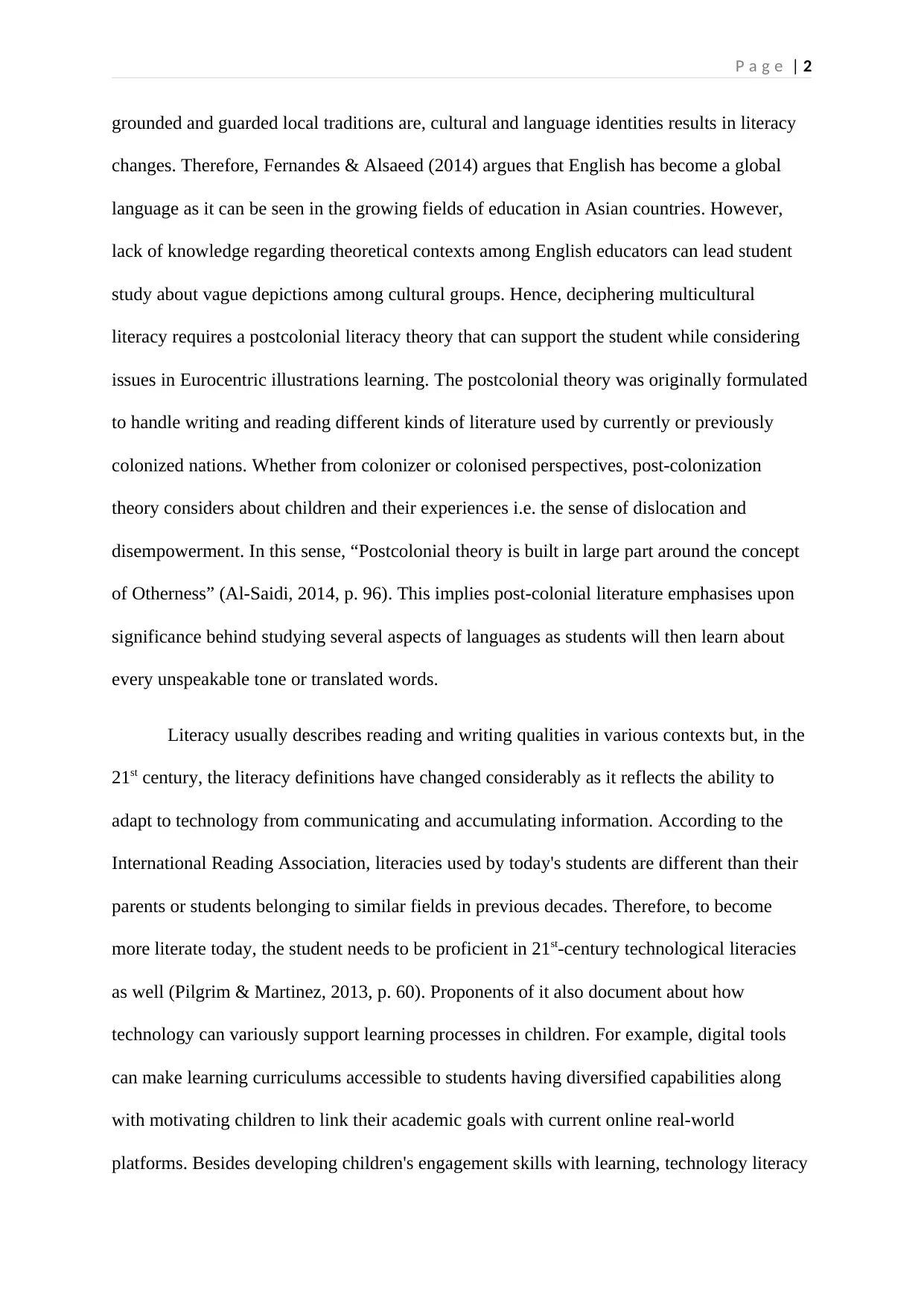
P a g e | 2
grounded and guarded local traditions are, cultural and language identities results in literacy
changes. Therefore, Fernandes & Alsaeed (2014) argues that English has become a global
language as it can be seen in the growing fields of education in Asian countries. However,
lack of knowledge regarding theoretical contexts among English educators can lead student
study about vague depictions among cultural groups. Hence, deciphering multicultural
literacy requires a postcolonial literacy theory that can support the student while considering
issues in Eurocentric illustrations learning. The postcolonial theory was originally formulated
to handle writing and reading different kinds of literature used by currently or previously
colonized nations. Whether from colonizer or colonised perspectives, post-colonization
theory considers about children and their experiences i.e. the sense of dislocation and
disempowerment. In this sense, “Postcolonial theory is built in large part around the concept
of Otherness” (Al-Saidi, 2014, p. 96). This implies post-colonial literature emphasises upon
significance behind studying several aspects of languages as students will then learn about
every unspeakable tone or translated words.
Literacy usually describes reading and writing qualities in various contexts but, in the
21st century, the literacy definitions have changed considerably as it reflects the ability to
adapt to technology from communicating and accumulating information. According to the
International Reading Association, literacies used by today's students are different than their
parents or students belonging to similar fields in previous decades. Therefore, to become
more literate today, the student needs to be proficient in 21st-century technological literacies
as well (Pilgrim & Martinez, 2013, p. 60). Proponents of it also document about how
technology can variously support learning processes in children. For example, digital tools
can make learning curriculums accessible to students having diversified capabilities along
with motivating children to link their academic goals with current online real-world
platforms. Besides developing children's engagement skills with learning, technology literacy
grounded and guarded local traditions are, cultural and language identities results in literacy
changes. Therefore, Fernandes & Alsaeed (2014) argues that English has become a global
language as it can be seen in the growing fields of education in Asian countries. However,
lack of knowledge regarding theoretical contexts among English educators can lead student
study about vague depictions among cultural groups. Hence, deciphering multicultural
literacy requires a postcolonial literacy theory that can support the student while considering
issues in Eurocentric illustrations learning. The postcolonial theory was originally formulated
to handle writing and reading different kinds of literature used by currently or previously
colonized nations. Whether from colonizer or colonised perspectives, post-colonization
theory considers about children and their experiences i.e. the sense of dislocation and
disempowerment. In this sense, “Postcolonial theory is built in large part around the concept
of Otherness” (Al-Saidi, 2014, p. 96). This implies post-colonial literature emphasises upon
significance behind studying several aspects of languages as students will then learn about
every unspeakable tone or translated words.
Literacy usually describes reading and writing qualities in various contexts but, in the
21st century, the literacy definitions have changed considerably as it reflects the ability to
adapt to technology from communicating and accumulating information. According to the
International Reading Association, literacies used by today's students are different than their
parents or students belonging to similar fields in previous decades. Therefore, to become
more literate today, the student needs to be proficient in 21st-century technological literacies
as well (Pilgrim & Martinez, 2013, p. 60). Proponents of it also document about how
technology can variously support learning processes in children. For example, digital tools
can make learning curriculums accessible to students having diversified capabilities along
with motivating children to link their academic goals with current online real-world
platforms. Besides developing children's engagement skills with learning, technology literacy
⊘ This is a preview!⊘
Do you want full access?
Subscribe today to unlock all pages.

Trusted by 1+ million students worldwide
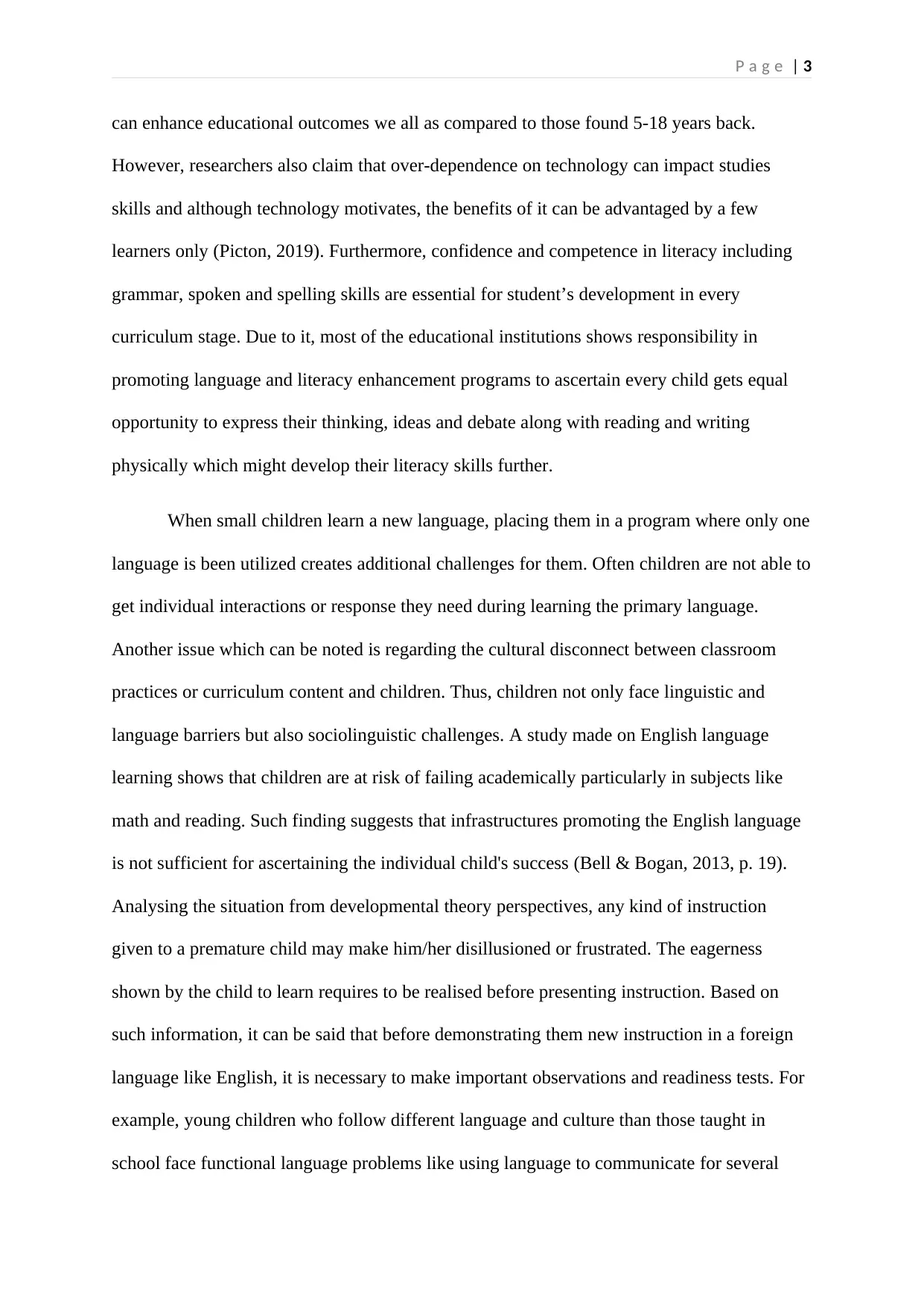
P a g e | 3
can enhance educational outcomes we all as compared to those found 5-18 years back.
However, researchers also claim that over-dependence on technology can impact studies
skills and although technology motivates, the benefits of it can be advantaged by a few
learners only (Picton, 2019). Furthermore, confidence and competence in literacy including
grammar, spoken and spelling skills are essential for student’s development in every
curriculum stage. Due to it, most of the educational institutions shows responsibility in
promoting language and literacy enhancement programs to ascertain every child gets equal
opportunity to express their thinking, ideas and debate along with reading and writing
physically which might develop their literacy skills further.
When small children learn a new language, placing them in a program where only one
language is been utilized creates additional challenges for them. Often children are not able to
get individual interactions or response they need during learning the primary language.
Another issue which can be noted is regarding the cultural disconnect between classroom
practices or curriculum content and children. Thus, children not only face linguistic and
language barriers but also sociolinguistic challenges. A study made on English language
learning shows that children are at risk of failing academically particularly in subjects like
math and reading. Such finding suggests that infrastructures promoting the English language
is not sufficient for ascertaining the individual child's success (Bell & Bogan, 2013, p. 19).
Analysing the situation from developmental theory perspectives, any kind of instruction
given to a premature child may make him/her disillusioned or frustrated. The eagerness
shown by the child to learn requires to be realised before presenting instruction. Based on
such information, it can be said that before demonstrating them new instruction in a foreign
language like English, it is necessary to make important observations and readiness tests. For
example, young children who follow different language and culture than those taught in
school face functional language problems like using language to communicate for several
can enhance educational outcomes we all as compared to those found 5-18 years back.
However, researchers also claim that over-dependence on technology can impact studies
skills and although technology motivates, the benefits of it can be advantaged by a few
learners only (Picton, 2019). Furthermore, confidence and competence in literacy including
grammar, spoken and spelling skills are essential for student’s development in every
curriculum stage. Due to it, most of the educational institutions shows responsibility in
promoting language and literacy enhancement programs to ascertain every child gets equal
opportunity to express their thinking, ideas and debate along with reading and writing
physically which might develop their literacy skills further.
When small children learn a new language, placing them in a program where only one
language is been utilized creates additional challenges for them. Often children are not able to
get individual interactions or response they need during learning the primary language.
Another issue which can be noted is regarding the cultural disconnect between classroom
practices or curriculum content and children. Thus, children not only face linguistic and
language barriers but also sociolinguistic challenges. A study made on English language
learning shows that children are at risk of failing academically particularly in subjects like
math and reading. Such finding suggests that infrastructures promoting the English language
is not sufficient for ascertaining the individual child's success (Bell & Bogan, 2013, p. 19).
Analysing the situation from developmental theory perspectives, any kind of instruction
given to a premature child may make him/her disillusioned or frustrated. The eagerness
shown by the child to learn requires to be realised before presenting instruction. Based on
such information, it can be said that before demonstrating them new instruction in a foreign
language like English, it is necessary to make important observations and readiness tests. For
example, young children who follow different language and culture than those taught in
school face functional language problems like using language to communicate for several
Paraphrase This Document
Need a fresh take? Get an instant paraphrase of this document with our AI Paraphraser
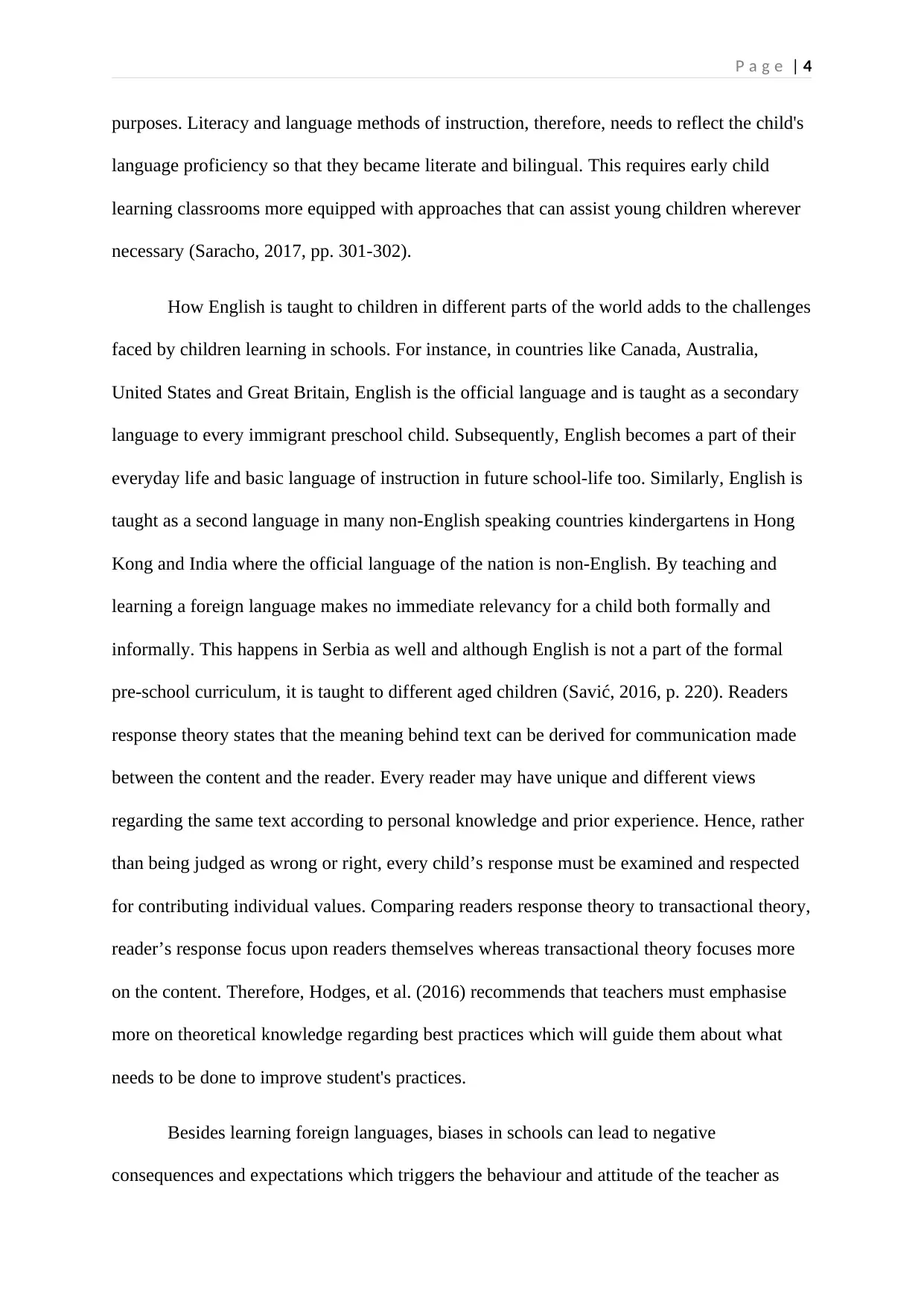
P a g e | 4
purposes. Literacy and language methods of instruction, therefore, needs to reflect the child's
language proficiency so that they became literate and bilingual. This requires early child
learning classrooms more equipped with approaches that can assist young children wherever
necessary (Saracho, 2017, pp. 301-302).
How English is taught to children in different parts of the world adds to the challenges
faced by children learning in schools. For instance, in countries like Canada, Australia,
United States and Great Britain, English is the official language and is taught as a secondary
language to every immigrant preschool child. Subsequently, English becomes a part of their
everyday life and basic language of instruction in future school-life too. Similarly, English is
taught as a second language in many non-English speaking countries kindergartens in Hong
Kong and India where the official language of the nation is non-English. By teaching and
learning a foreign language makes no immediate relevancy for a child both formally and
informally. This happens in Serbia as well and although English is not a part of the formal
pre-school curriculum, it is taught to different aged children (Savić, 2016, p. 220). Readers
response theory states that the meaning behind text can be derived for communication made
between the content and the reader. Every reader may have unique and different views
regarding the same text according to personal knowledge and prior experience. Hence, rather
than being judged as wrong or right, every child’s response must be examined and respected
for contributing individual values. Comparing readers response theory to transactional theory,
reader’s response focus upon readers themselves whereas transactional theory focuses more
on the content. Therefore, Hodges, et al. (2016) recommends that teachers must emphasise
more on theoretical knowledge regarding best practices which will guide them about what
needs to be done to improve student's practices.
Besides learning foreign languages, biases in schools can lead to negative
consequences and expectations which triggers the behaviour and attitude of the teacher as
purposes. Literacy and language methods of instruction, therefore, needs to reflect the child's
language proficiency so that they became literate and bilingual. This requires early child
learning classrooms more equipped with approaches that can assist young children wherever
necessary (Saracho, 2017, pp. 301-302).
How English is taught to children in different parts of the world adds to the challenges
faced by children learning in schools. For instance, in countries like Canada, Australia,
United States and Great Britain, English is the official language and is taught as a secondary
language to every immigrant preschool child. Subsequently, English becomes a part of their
everyday life and basic language of instruction in future school-life too. Similarly, English is
taught as a second language in many non-English speaking countries kindergartens in Hong
Kong and India where the official language of the nation is non-English. By teaching and
learning a foreign language makes no immediate relevancy for a child both formally and
informally. This happens in Serbia as well and although English is not a part of the formal
pre-school curriculum, it is taught to different aged children (Savić, 2016, p. 220). Readers
response theory states that the meaning behind text can be derived for communication made
between the content and the reader. Every reader may have unique and different views
regarding the same text according to personal knowledge and prior experience. Hence, rather
than being judged as wrong or right, every child’s response must be examined and respected
for contributing individual values. Comparing readers response theory to transactional theory,
reader’s response focus upon readers themselves whereas transactional theory focuses more
on the content. Therefore, Hodges, et al. (2016) recommends that teachers must emphasise
more on theoretical knowledge regarding best practices which will guide them about what
needs to be done to improve student's practices.
Besides learning foreign languages, biases in schools can lead to negative
consequences and expectations which triggers the behaviour and attitude of the teacher as
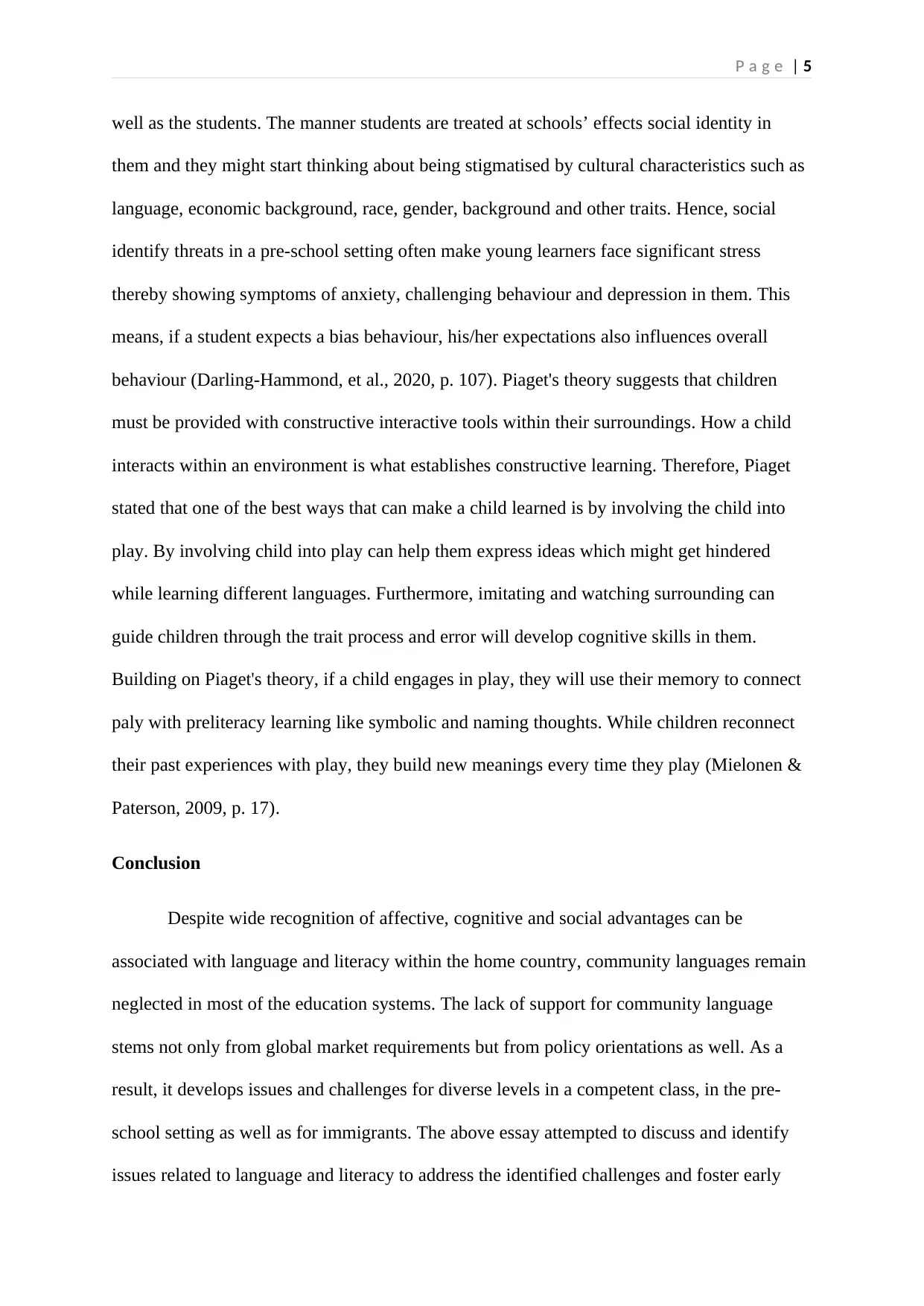
P a g e | 5
well as the students. The manner students are treated at schools’ effects social identity in
them and they might start thinking about being stigmatised by cultural characteristics such as
language, economic background, race, gender, background and other traits. Hence, social
identify threats in a pre-school setting often make young learners face significant stress
thereby showing symptoms of anxiety, challenging behaviour and depression in them. This
means, if a student expects a bias behaviour, his/her expectations also influences overall
behaviour (Darling-Hammond, et al., 2020, p. 107). Piaget's theory suggests that children
must be provided with constructive interactive tools within their surroundings. How a child
interacts within an environment is what establishes constructive learning. Therefore, Piaget
stated that one of the best ways that can make a child learned is by involving the child into
play. By involving child into play can help them express ideas which might get hindered
while learning different languages. Furthermore, imitating and watching surrounding can
guide children through the trait process and error will develop cognitive skills in them.
Building on Piaget's theory, if a child engages in play, they will use their memory to connect
paly with preliteracy learning like symbolic and naming thoughts. While children reconnect
their past experiences with play, they build new meanings every time they play (Mielonen &
Paterson, 2009, p. 17).
Conclusion
Despite wide recognition of affective, cognitive and social advantages can be
associated with language and literacy within the home country, community languages remain
neglected in most of the education systems. The lack of support for community language
stems not only from global market requirements but from policy orientations as well. As a
result, it develops issues and challenges for diverse levels in a competent class, in the pre-
school setting as well as for immigrants. The above essay attempted to discuss and identify
issues related to language and literacy to address the identified challenges and foster early
well as the students. The manner students are treated at schools’ effects social identity in
them and they might start thinking about being stigmatised by cultural characteristics such as
language, economic background, race, gender, background and other traits. Hence, social
identify threats in a pre-school setting often make young learners face significant stress
thereby showing symptoms of anxiety, challenging behaviour and depression in them. This
means, if a student expects a bias behaviour, his/her expectations also influences overall
behaviour (Darling-Hammond, et al., 2020, p. 107). Piaget's theory suggests that children
must be provided with constructive interactive tools within their surroundings. How a child
interacts within an environment is what establishes constructive learning. Therefore, Piaget
stated that one of the best ways that can make a child learned is by involving the child into
play. By involving child into play can help them express ideas which might get hindered
while learning different languages. Furthermore, imitating and watching surrounding can
guide children through the trait process and error will develop cognitive skills in them.
Building on Piaget's theory, if a child engages in play, they will use their memory to connect
paly with preliteracy learning like symbolic and naming thoughts. While children reconnect
their past experiences with play, they build new meanings every time they play (Mielonen &
Paterson, 2009, p. 17).
Conclusion
Despite wide recognition of affective, cognitive and social advantages can be
associated with language and literacy within the home country, community languages remain
neglected in most of the education systems. The lack of support for community language
stems not only from global market requirements but from policy orientations as well. As a
result, it develops issues and challenges for diverse levels in a competent class, in the pre-
school setting as well as for immigrants. The above essay attempted to discuss and identify
issues related to language and literacy to address the identified challenges and foster early
⊘ This is a preview!⊘
Do you want full access?
Subscribe today to unlock all pages.

Trusted by 1+ million students worldwide
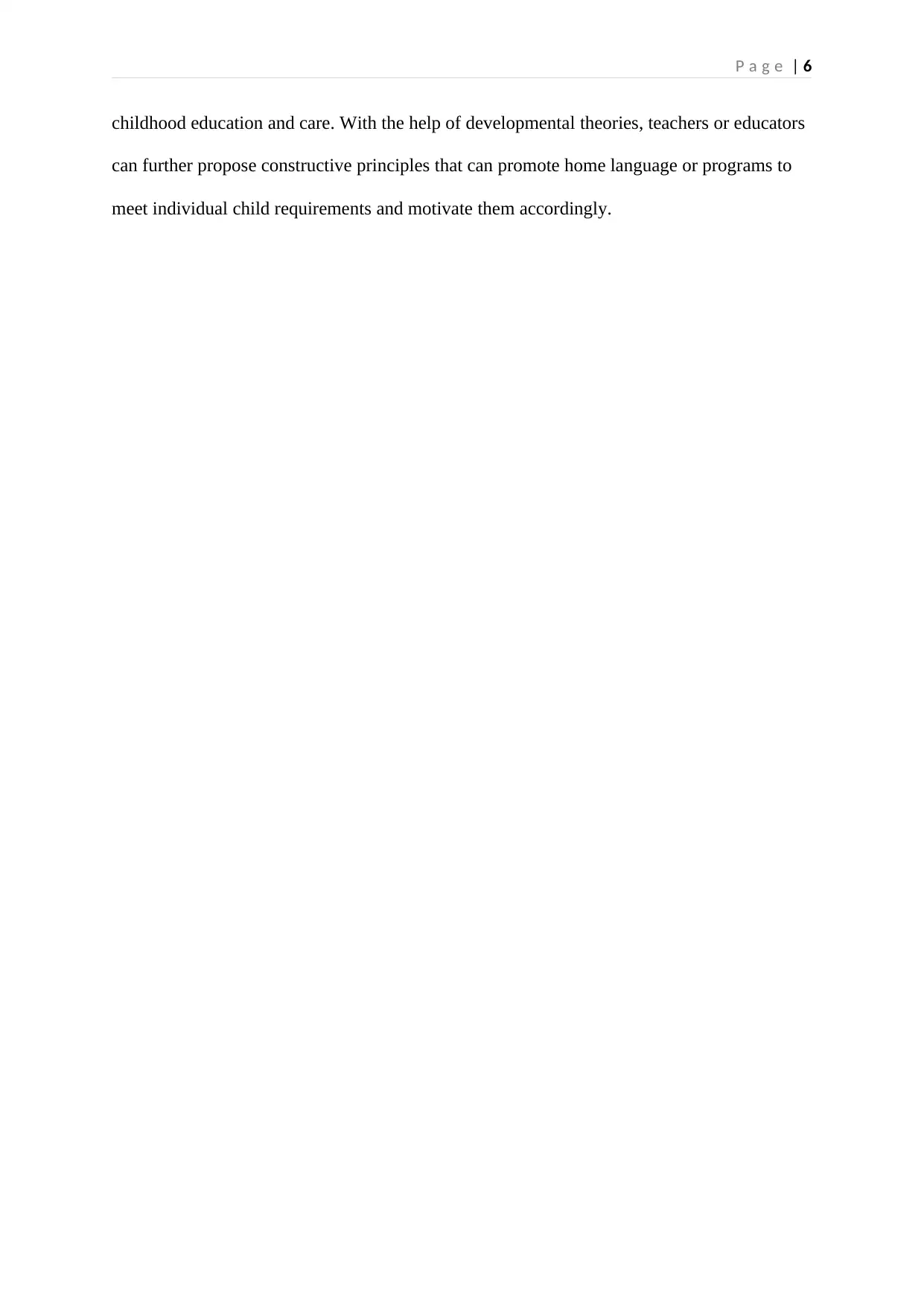
P a g e | 6
childhood education and care. With the help of developmental theories, teachers or educators
can further propose constructive principles that can promote home language or programs to
meet individual child requirements and motivate them accordingly.
childhood education and care. With the help of developmental theories, teachers or educators
can further propose constructive principles that can promote home language or programs to
meet individual child requirements and motivate them accordingly.
Paraphrase This Document
Need a fresh take? Get an instant paraphrase of this document with our AI Paraphraser
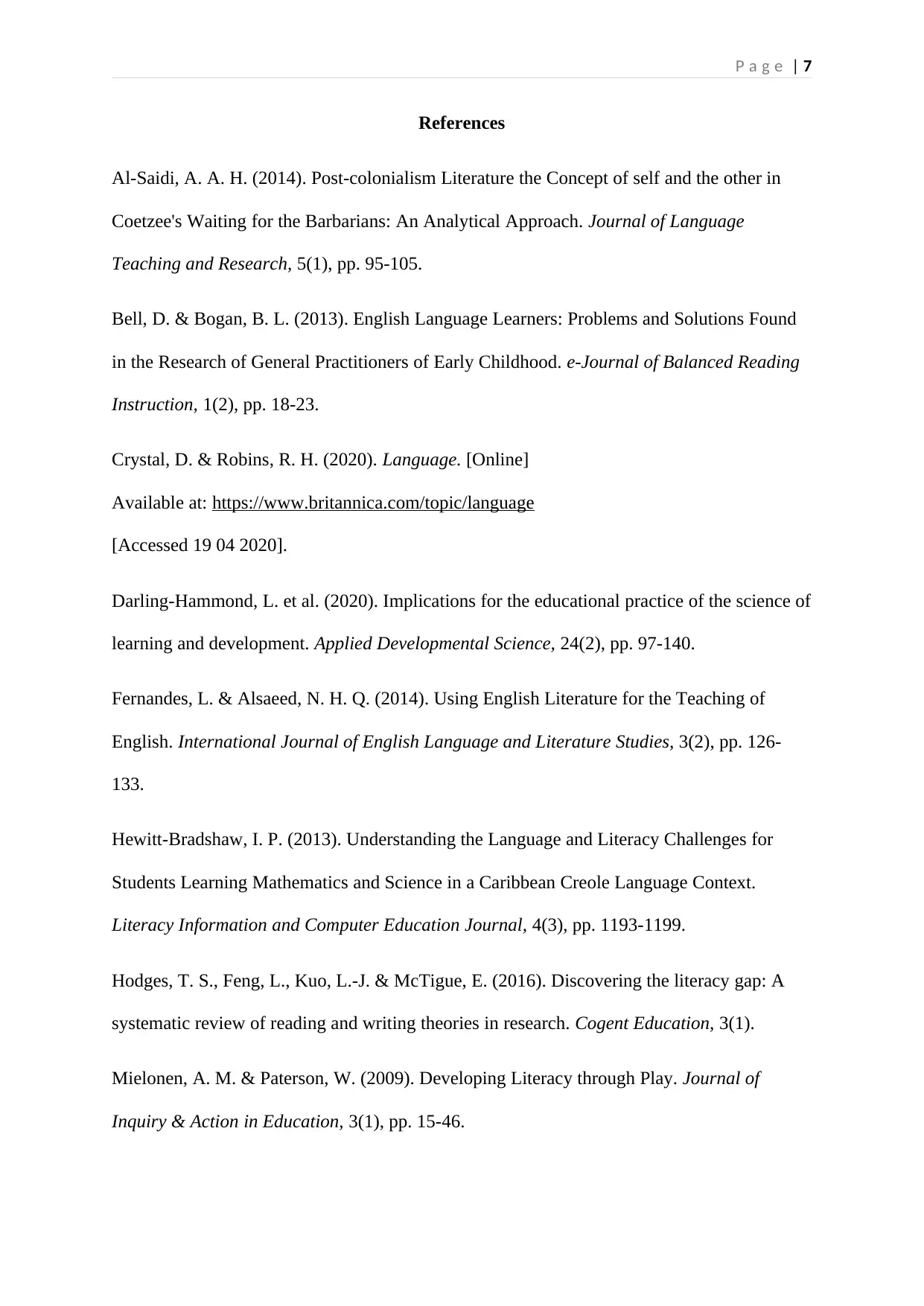
P a g e | 7
References
Al-Saidi, A. A. H. (2014). Post-colonialism Literature the Concept of self and the other in
Coetzee's Waiting for the Barbarians: An Analytical Approach. Journal of Language
Teaching and Research, 5(1), pp. 95-105.
Bell, D. & Bogan, B. L. (2013). English Language Learners: Problems and Solutions Found
in the Research of General Practitioners of Early Childhood. e-Journal of Balanced Reading
Instruction, 1(2), pp. 18-23.
Crystal, D. & Robins, R. H. (2020). Language. [Online]
Available at: https://www.britannica.com/topic/language
[Accessed 19 04 2020].
Darling-Hammond, L. et al. (2020). Implications for the educational practice of the science of
learning and development. Applied Developmental Science, 24(2), pp. 97-140.
Fernandes, L. & Alsaeed, N. H. Q. (2014). Using English Literature for the Teaching of
English. International Journal of English Language and Literature Studies, 3(2), pp. 126-
133.
Hewitt-Bradshaw, I. P. (2013). Understanding the Language and Literacy Challenges for
Students Learning Mathematics and Science in a Caribbean Creole Language Context.
Literacy Information and Computer Education Journal, 4(3), pp. 1193-1199.
Hodges, T. S., Feng, L., Kuo, L.-J. & McTigue, E. (2016). Discovering the literacy gap: A
systematic review of reading and writing theories in research. Cogent Education, 3(1).
Mielonen, A. M. & Paterson, W. (2009). Developing Literacy through Play. Journal of
Inquiry & Action in Education, 3(1), pp. 15-46.
References
Al-Saidi, A. A. H. (2014). Post-colonialism Literature the Concept of self and the other in
Coetzee's Waiting for the Barbarians: An Analytical Approach. Journal of Language
Teaching and Research, 5(1), pp. 95-105.
Bell, D. & Bogan, B. L. (2013). English Language Learners: Problems and Solutions Found
in the Research of General Practitioners of Early Childhood. e-Journal of Balanced Reading
Instruction, 1(2), pp. 18-23.
Crystal, D. & Robins, R. H. (2020). Language. [Online]
Available at: https://www.britannica.com/topic/language
[Accessed 19 04 2020].
Darling-Hammond, L. et al. (2020). Implications for the educational practice of the science of
learning and development. Applied Developmental Science, 24(2), pp. 97-140.
Fernandes, L. & Alsaeed, N. H. Q. (2014). Using English Literature for the Teaching of
English. International Journal of English Language and Literature Studies, 3(2), pp. 126-
133.
Hewitt-Bradshaw, I. P. (2013). Understanding the Language and Literacy Challenges for
Students Learning Mathematics and Science in a Caribbean Creole Language Context.
Literacy Information and Computer Education Journal, 4(3), pp. 1193-1199.
Hodges, T. S., Feng, L., Kuo, L.-J. & McTigue, E. (2016). Discovering the literacy gap: A
systematic review of reading and writing theories in research. Cogent Education, 3(1).
Mielonen, A. M. & Paterson, W. (2009). Developing Literacy through Play. Journal of
Inquiry & Action in Education, 3(1), pp. 15-46.
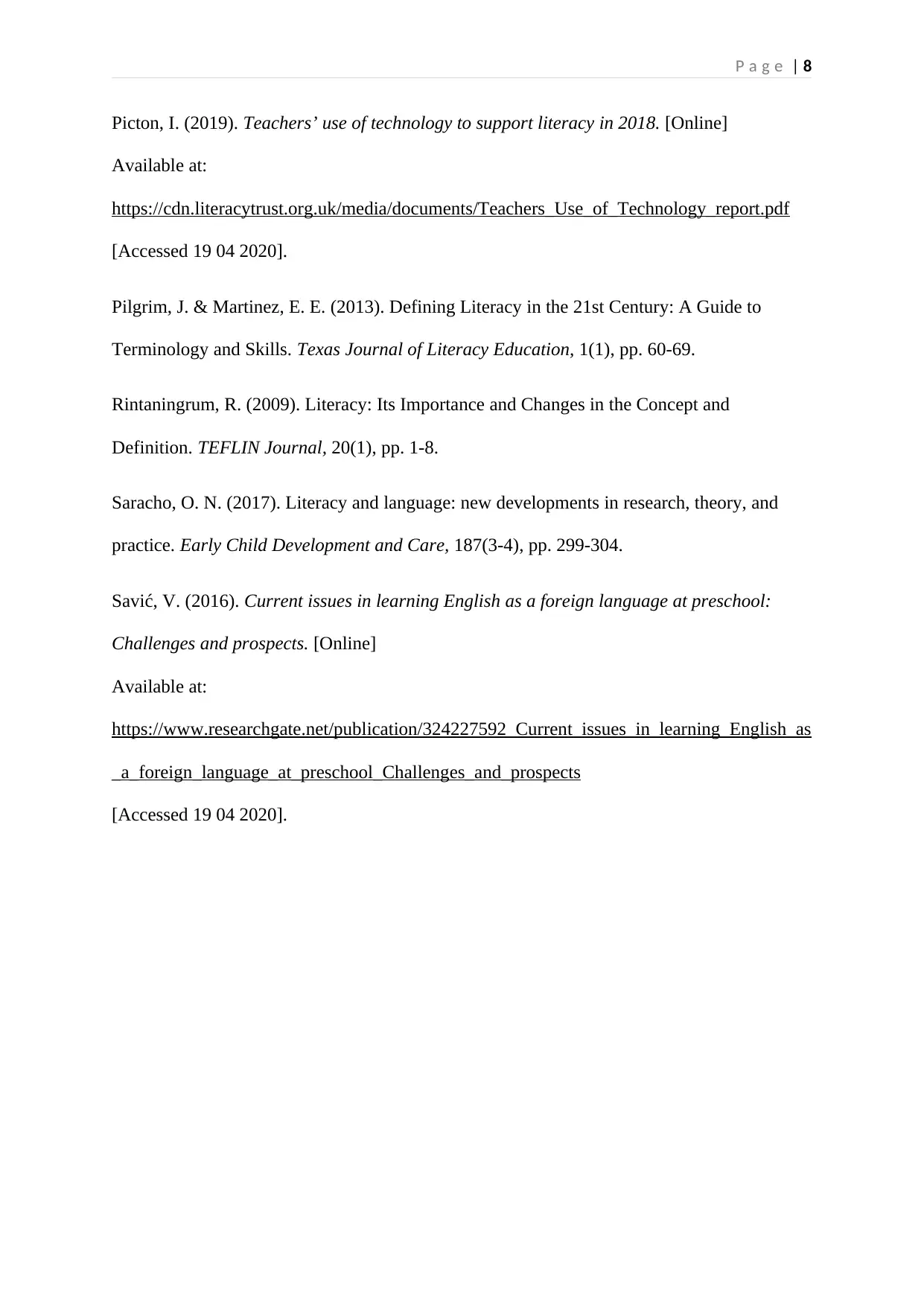
P a g e | 8
Picton, I. (2019). Teachers’ use of technology to support literacy in 2018. [Online]
Available at:
https://cdn.literacytrust.org.uk/media/documents/Teachers_Use_of_Technology_report.pdf
[Accessed 19 04 2020].
Pilgrim, J. & Martinez, E. E. (2013). Defining Literacy in the 21st Century: A Guide to
Terminology and Skills. Texas Journal of Literacy Education, 1(1), pp. 60-69.
Rintaningrum, R. (2009). Literacy: Its Importance and Changes in the Concept and
Definition. TEFLIN Journal, 20(1), pp. 1-8.
Saracho, O. N. (2017). Literacy and language: new developments in research, theory, and
practice. Early Child Development and Care, 187(3-4), pp. 299-304.
Savić, V. (2016). Current issues in learning English as a foreign language at preschool:
Challenges and prospects. [Online]
Available at:
https://www.researchgate.net/publication/324227592_Current_issues_in_learning_English_as
_a_foreign_language_at_preschool_Challenges_and_prospects
[Accessed 19 04 2020].
Picton, I. (2019). Teachers’ use of technology to support literacy in 2018. [Online]
Available at:
https://cdn.literacytrust.org.uk/media/documents/Teachers_Use_of_Technology_report.pdf
[Accessed 19 04 2020].
Pilgrim, J. & Martinez, E. E. (2013). Defining Literacy in the 21st Century: A Guide to
Terminology and Skills. Texas Journal of Literacy Education, 1(1), pp. 60-69.
Rintaningrum, R. (2009). Literacy: Its Importance and Changes in the Concept and
Definition. TEFLIN Journal, 20(1), pp. 1-8.
Saracho, O. N. (2017). Literacy and language: new developments in research, theory, and
practice. Early Child Development and Care, 187(3-4), pp. 299-304.
Savić, V. (2016). Current issues in learning English as a foreign language at preschool:
Challenges and prospects. [Online]
Available at:
https://www.researchgate.net/publication/324227592_Current_issues_in_learning_English_as
_a_foreign_language_at_preschool_Challenges_and_prospects
[Accessed 19 04 2020].
⊘ This is a preview!⊘
Do you want full access?
Subscribe today to unlock all pages.

Trusted by 1+ million students worldwide
1 out of 9
Related Documents
Your All-in-One AI-Powered Toolkit for Academic Success.
+13062052269
info@desklib.com
Available 24*7 on WhatsApp / Email
![[object Object]](/_next/static/media/star-bottom.7253800d.svg)
Unlock your academic potential
Copyright © 2020–2026 A2Z Services. All Rights Reserved. Developed and managed by ZUCOL.




